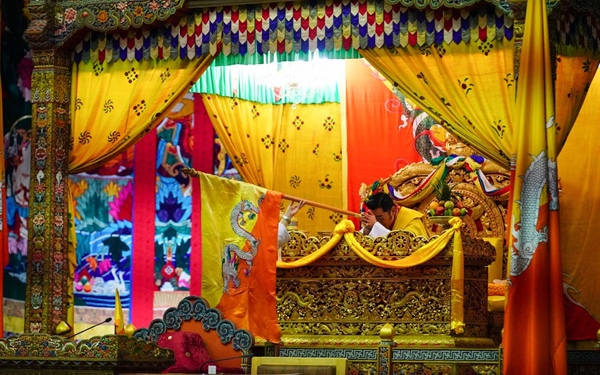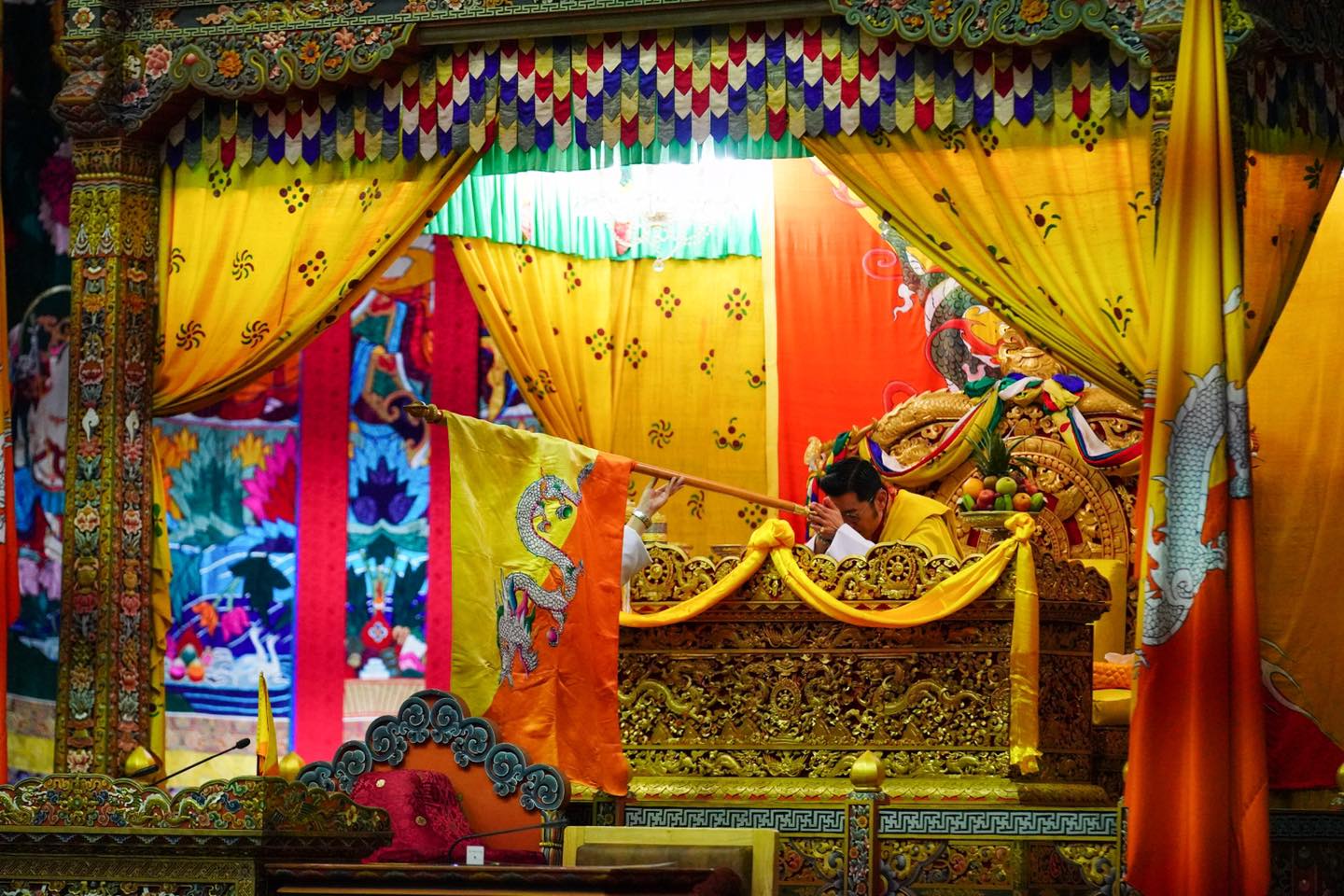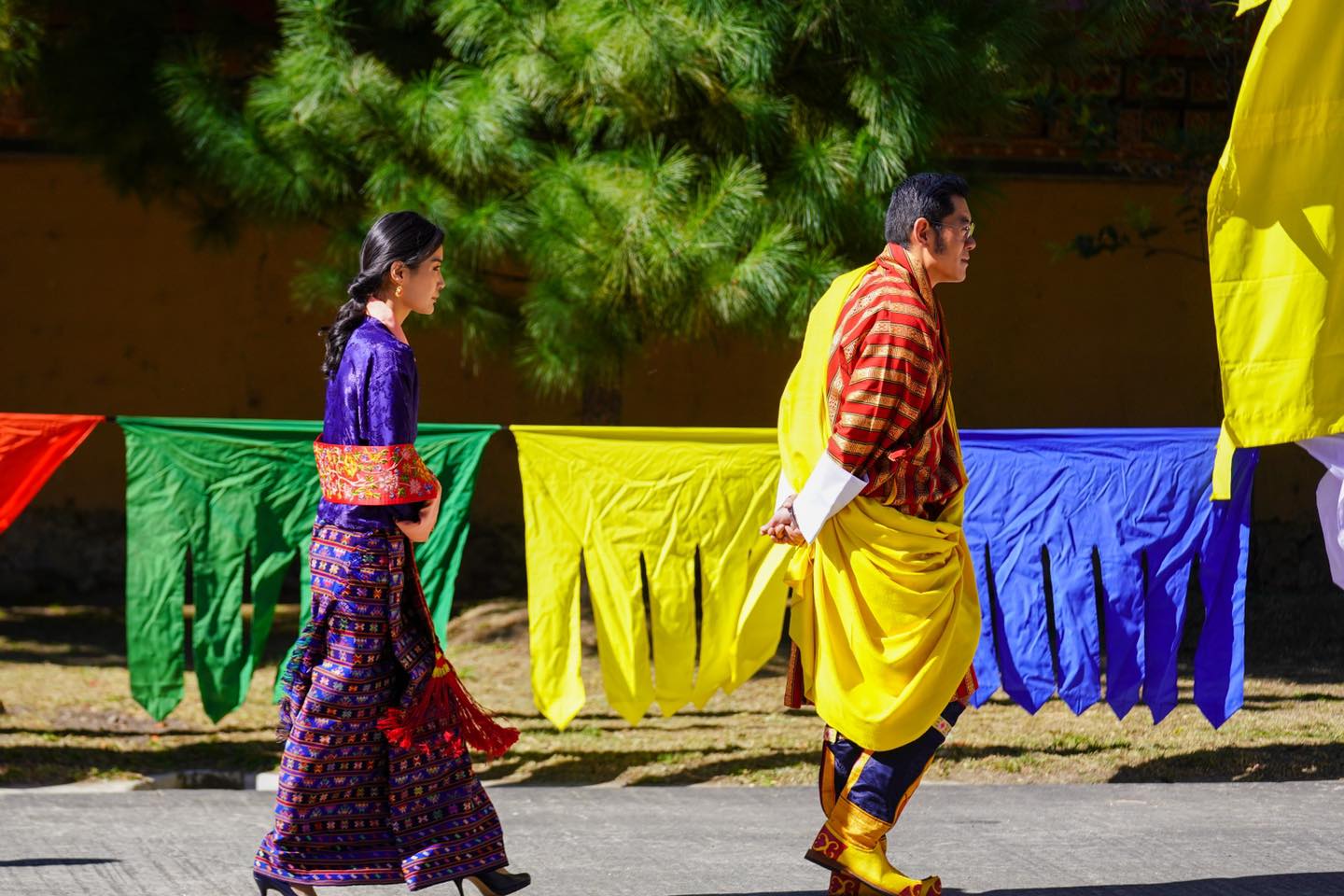Translation of His Majesty's Address to the Nation at the 8th Session of the Third Parliament
His Majesty delivered the Royal Address on the Opening Ceremony of the 8th Session of the Third Parliament, 4th November, 2022.

Recently, I met a 27-year-old woman who has a four-year-old son. She works in a café, and makes Nu. 12,500 a month. Her house rent is Nu. 7,750. She is her family’s sole breadwinner. I was dismayed to hear about her struggles supporting her family and trying to make ends meet.
Thimphu is seen as a place of opportunities for our youth. But the young people I met in Thimphu face many challenges. They work long hours, six days a week. But they make less than the average monthly rent for an apartment. They live with roommates and pool their incomes just to get by.
When we have a fever and sore throat, we know that we are sick. Similarly, when our youth are struggling to make ends meet, this is a symptom that our country is unwell.
We have been well-aware of our problems for a while now. A lot of work has gone into trying to address them. We have drawn up strategies, plans and policies. We have sent our best Bhutanese to top Universities abroad, and our officials on study tours to bring in fresh ideas and solutions. We have even recruited foreign and local consultants. We have set up commissions and departments, and held meeting after meeting to try to crack the issues we face. Despite all our hard work, we have failed to produce results. This is a matter of grave concern.
However, the ongoing national efforts for transformation gives me hope. For the first time since I became King 16 years ago, I see a new dawn over the horizon. There is a perceptible difference in our efforts this time. There has been a shift in attitudes towards work, and a greater sense of concern, seriousness and urgency, even as we tackle the increasing volume of work.
I want to thank the members of the National Assembly and National Council for supporting this national endeavour.
I also want to express my appreciation to the Opposition Party, who has not only stood in solidarity with the government during the pandemic to keep our country safe, but also continues to support the ongoing transformation efforts. This shows that our Opposition Party understands the importance of the task at hand, and prioritises the wellbeing of our country and people over any political mileage that they could gain. This augurs well for the future of our democracy.
Our civil servants have put in tremendous time and effort to battle the pandemic. In the transformation process, the focus is once again on them. With increasing workload and having to adjust to many changes, they have been under more stress. They have shouldered their responsibilities admirably, placing the welfare of the nation above self-interest. I appreciate their dedication and service.
It is difficult for elected governments to introduce change, even if they are beneficial for the country. Whereas a new, finished bridge is welcomed by the people, not everyone is willing to contribute, participate and make sacrifices during construction. Our government, led by the Prime Minister, has been fearless and firm in their resolve to carry out the transformation process, which we all deeply appreciate.
This monumental transformation taking place in the country today would not have been possible without our people’s understanding and support. Moreover, the ongoing work stems from the aspirations of our people, who are well aware of our problems, as well as the steps needed to course-correct for our present and future.
As a nation, we are at an inflection point. Our actions today will determine the course of our future, and put us either in the path of success or failure. There will not be any more opportunities, and we have no choice but to work with the greatest sense of urgency.
In the past, Bhutan relied heavily on income from hydropower to drive national development and growth. This is no longer the case. Major projects like Punatshangchu 1 and Kholongchu have cost us heavy losses and increased national debt. They remain incomplete even after more than a decade. Progress in the energy sector has made electricity cheaper in India, which means the hydropower we produce is becoming less and less competitive.
Socio-economic development, to improve the lives of our people, requires capital investments. Bhutan has relied mainly on foreign grants and loans, which makes us extremely vulnerable.
We may look to trade to support economic growth. But today our balance of trade is in deficit. We import far more than we export. Just like a person whose expenses exceed income remains poor, a country with more imports than exports grows poorer. Our weak economy, low productivity and negligible levels of technological adoption creates an environment that suppresses opportunities for learning and growth.
It is impossible to drastically raise wages in such a situation, unless the country irresponsibly borrows large amounts of money to distribute freely to supplement incomes. Our youth are left with no choice but to seek opportunities elsewhere. While Australia has become emblematic of this trend, we know that there are Bhutanese working in almost 100 countries across the world. We can only expect more of them to leave in the coming years, if our situation does not improve.
Maybe we accept this for the present, expecting that our children will surely be better off later on. For our children to succeed, they must receive a good education. The reality is that the education we are giving them today falls short of global standards. By failing to equip them with the skills and competencies needed for the 21st century, we are putting their futures at risk.
As a small country with a small population, it should have been easier for Bhutan to achieve our goals. But we have some major administration and management issues. Our operating costs and the cost of delivering services are high. Our operational efficiency is low. There are systemic weaknesses, gaps, and inefficiencies, leading to huge wastage. There is little accountability. The amount of resources, time and effort spent does not produce corresponding results. It takes four people to do one person’s job, costs two or three times more, and takes two or three times longer. I am deeply concerned that we will not progress further at the rate we are going.
There is no need to be embarrassed, upset, distressed, or alarmed. But we must be deeply concerned. There is no shame in acknowledging past mistakes. But we cannot continue making the same mistakes going forward. We may have failed once, but we cannot afford to fail again. Our task ahead is to bring about change and transformation, and radically improve the lives of our people. This is not the time to shift the responsibility to someone else. It is important that our people identify the nature and extent of our problems, and recognise that now is the time to take ownership to fix them.
As we undertake this monumental task, some people may ask if we are ready. If we start with doubt and hesitation, we will never be ready. I am confident that Bhutan is ready for change, and that we must accomplish it as soon as possible. Others, who understand the importance of our endeavour, may still advocate for a slower and less disruptive pace of change.
The fact remains that our situation has never been more critical. We have numerous challenges and a tremendous amount of work, and time is running out. If we are in the middle of a great river, and our only option is to swim ashore, we cannot expect to emerge dry and comfortable. I firmly believe that we must act as swiftly as possible to address all our problems, and avert the risks that threaten our very future.
Some people may wonder if transformation and change means that our national objectives have changed. Our national goals and objectives as a country will never change. Our goals remain the same- to fulfill the aspirations of our people, by strengthening national sovereignty and security, and ensuring the wellbeing and happiness of our people now and in the future. It is our manner and approach to work that is changing.
If we continue working in the same manner as before, we will fail to achieve our objectives, and bring suffering upon our people. This will be a great moral transgression on our part. On the other hand, our greatest achievement will be bringing about the right changes and successfully averting a bleak future.
Some of you may ask, will we succeed?
Yes, we will succeed because we must succeed. Failure is not an option. Why? Ask yourself, what is the purpose of undertaking transformation and change? Is it for me? Is it for you? No. It is for us- for all the people of Bhutan, and for future generations.
We are working for a noble purpose. The Bhutanese are a people of great integrity and strength. We are a united people. If we are firm in our resolve, we will surely succeed. We need strong and able leaders for this task. Even though our population is small, we have many capable and dependable people to lead the way.
I do not mean success will be automatic or easy. If we work hand-in-hand and pledge ourselves in the service of the nation, we will succeed. It is only when all our people are genuinely invested in our future, take ownership, shoulder responsibility, and hold ourselves and one another accountable and to higher standards, that we will accomplish what we have set out to do.
Consider the increasing amount of litter in our cities and towns. From time to time, we see volunteers from different sections of society carrying out cleaning campaigns, toiling outside to clean up public spaces, driven by a genuine sense of service to the community. At the same time, we also have many people who litter thoughtlessly. If one hand picks up litter but the other hand keeps throwing it, we will always have a problem. Which group do you belong to?
This equally applies to all that we are doing to pursue our national objectives. If one hand is used to undo the other hand’s work, we will not move forward. As a society, it is time for us to join hands, and work with a common purpose. Next, you may ask, what might impede transformation?
First, we need money. While adequate funds will make our task easier, insufficient funds will hamper progress.
Second, while it is easy to make changes, it is much harder to sustain them. Any improvements that have been introduced must be institutionalised. They must be enduring and ubiquitous. Taking the example of a thermometer— applying heat will raise the mercury and give us a higher reading, but it will return to zero as soon as the heat is removed. Unlike a thermometer, our work should be built on progress, and not be reversed as soon as we ease our efforts.
Finally, change must extend to our people, if they are to be readied for the future. As a Buddhist Kingdom, Bhutanese are a compassionate people, with a strong moral compass and sense of community. These are admirable qualities. However, we also need to have the skills, abilities and professionalism necessary to thrive in the 21st century. Our mindset and approach to work must reflect the demands of the 21st century. By and large we are unacquainted with such an outlook, and this is where we have to prepare our people for change.
It is far easier to make structural and administrative changes than to change mindsets. This is a difficult and challenging but nevertheless necessary task. When will we see the results of our efforts?
We will see results in three stages. We are already beginning to see some results. There are structural changes in the civil service to bring greater clarity to an agency’s goals, roles and responsibilities. More importantly, there is a visible change in our civil servants’ attitude and approach to work. There is a greater focus on accountability and attention to detail. There are higher expectations and lower tolerance for lapses and oversight.
For example, it was reported that the Bank of Bhutan (BoB) was penalised by the Royal Monetary Authority (RMA) for a system failure that shutdown BoB for 3 days. In the past, such lapses that caused a great deal of inconvenience to the public would have gone unnoticed. At most, the bank would have gotten a slap on the wrist and be asked to submit a letter of explanation.
This reflects a much larger change in mindset and attitude within the bureaucracy. In this instance, RMA not only levied a substantial fine, but also required BOB to submit a business continuity plan to be prepared for any contingencies in the future. This is an extremely good sign for things to come. We are starting to see things through from start to end. We are acknowledging problems, taking others to task, and ensuring lapses are corrected.
Another example is from the Election Commission of Bhutan (ECB). 15 years after we introduced democracy in Bhutan, we see that the ECB has raised the bar for being elected into office. Democracy was introduced in Bhutan by His Majesty the Fourth Druk Gyalpo, with the wish that we build a strong democracy that will always live up to the expectations of the people, by being the bedrock of integrity, trust and dependability. With many failed democracies the world over, our forefathers laid out a vision for an exemplary democracy with service to people always at the forefront. This means consistently raising our expectations from elected officials. The ECB’s new standards reflects a changed mindset within the organization, and shows that they have internalized the spirit of the transformation, and understood their responsibility with greater clarity.
Conversely, we often see things remain in a state of inertia for decades. For example, when the Sustainable Development Fee for Tourism was raised for the first time in over 30 years, it came as a shock. This happened because the SDF had not been revisited at all in that period. We must not allow democracy to stagnate in the same manner. Rather, we must constantly seek to raise the bar.
We see many new faces in positions of leadership and responsibility. Some may think that this means younger people are being given the opportunity for leadership roles. I would say that competence is being given more weightage. We are making good progress in building a meritocratic system.
I am reassured to see these changes in mindset and approach.
We will begin to see results from the structural, legal, policy, and economic changes in the next 2-3 years. This is the second phase. The third phase is continuity. This is not a one-time exercise. Rather, change is the only constant. Maintaining this momentum of change means continued assessments, reviews, tracking and monitoring.
Now when we talk about holding agencies and individuals accountable, it does not mean that we want to create a system driven by punishment and fear. We have to ask ourselves, whom do we serve? Not any agency or individual. But the people. Those in leadership positions and responsible for public service delivery must be held accountable. That is the only way to ensure the wellbeing of our people and our continued progress as a country.
There may be some who ask, aren’t these goals we have outlined far too ambitious and idealistic for a small country like ours? We believe that Bhutan is extraordinary- the land of Pelden Drukpa, blessed by Guru Rinpoche and Zhabdrung Ngawang Namgyel. If we want to remain exceptional, our efforts should also be exceptional. As a small, developing country sandwiched between two giant neighbours, in an ever-changing world, our only option is to be extraordinary. We must focus all our current efforts to build strong foundations of an extraordinary nation.
As King, I have pledged my life and service for the wellbeing of our country and people. If I had the slightest doubt that our goals were far beyond our reach, I would not encourage our people to pursue them. I am fully confident in the capabilities of our people. I believe that we can achieve everything we set out to do.
At the start, I shared the story of a young mother of a four-year-old child. Her name is Karma Dechen, and she is from Pemagatshel. Maybe Karma Dechen is watching television now, or she will later. If asked, she might say that I spoke about the importance of transformation and change, how we have failed in the past but must succeed now, and that we will succeed if we all shoulder responsibility and work as a united people. I said this is for the benefit of our country and people.
Maybe she will wonder how this will affect her, Karma Dechen, at a direct and personal level.
Karma Dechen, rest assured that we will do our best to bring about the transformation that our country urgently needs. Your circumstances trouble us just as much, and we are determined to succeed in resolving them.
You have a four-year-old son. If nothing changes, your son’s future will be uncertain. This endeavour is so that he will get a good education in Bhutan, and grow up to be a capable young man, a proud Bhutanese who can succeed anywhere in the world. Today, you are struggling financially. If things don’t change, your circumstances will not have improved even when you have grown old. This transformation is so that you will have your own home, money, and the ability to leave your children an inheritance.
In the meantime, the State must do everything it can to empower you. Today you are 27. In 10 years, you will still be only 37. If things don’t change now, those 10 years would have passed by in a flash, still leaving you vulnerable and struggling to make ends meet. Empowering you means giving you the opportunity to gain new skills and move on to higher paying jobs, or maybe even hold multiple jobs. It means that you can financially stand on your own feet. It means enabling your husband to get a good job to supplement your household income, and give your son a better life.
Our efforts are geared towards making our country prosperous, so that wages can rise, and you and your peers can afford a better life. When I met you, you had tears in your eyes. Those were tears of uncertainty, hardship, and the weight of your responsibilities as a mother who wants to give her son a better life. The purpose of our endeavours is to erase the cause of your tears, to give you security, happiness and peace of mind.
All our efforts are for you. Someday you may decide to have more children. Our efforts are also for them. With our small population, every child is a national treasure. Our objective here is to build a strong foundation and pave the way for your unborn children.
In this journey of nation building, just as the State has to play its part, I know that you too will do so.






